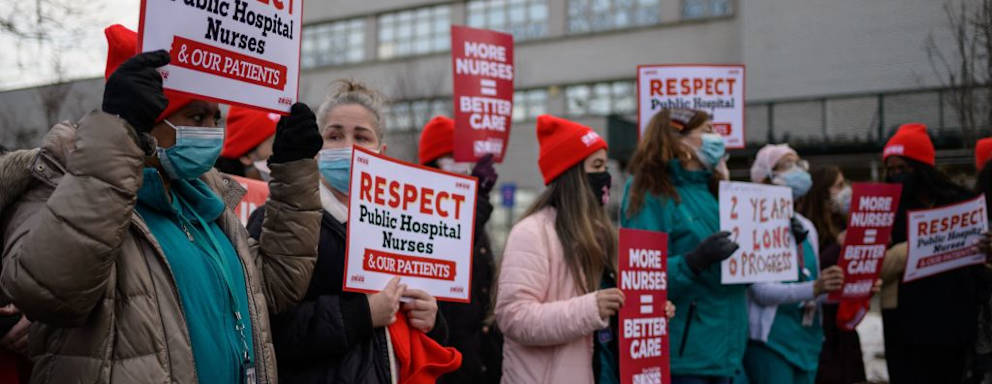New York Nurses Set to Strike for Fair Contract
 Credit: AFP via Getty Images
Credit: AFP via Getty ImagesEditor’s Note: This page will be updated as news becomes available.
Update:
On Friday, December 30, the New York State Nurses Association (NYSNA) issued a 10-day notice to eight hospitals in hopes of reaching a fair contract agreement. New York-Presbyterian Hospital nurses reached a tentative agreement on January 1.
On January 5, Maimonides Medical Center and Richmond University Medical Center reached a tentative agreement that addresses improving safe staffing and wages. Nurses will now vote on whether to ratify the new contract.
On January 9, approximately 7,000 nurses at Montefiore Medical Center in the Bronx and Mount Sinai Hospital in Harlem went on strike for a fair contract. Nurses at Maimonides Medical Center ratified a new contract securing safe staffing, an annual salary increase, and improved health benefits with no increased cost to employees. And, nurses at Flushing Hospital Medical Center, Mount Sinai Morningside and West, BroncCare and The Brooklyn Hospital Center reached tentative agreements.
After a three-day strike, nurses at Montefiore Medical Center in the Bronx and Mount Sinai Hospital in Harlem are back to work after reaching a tentative contract agreement.
- On Friday, December 30, the New York State Nurses Association (NYSNA) issued a 10-day notice to eight hospitals in hopes of reaching a fair contract agreement.
- On January 9, NYSNA nurses plan to strike for fair wages, better healthcare benefits, and safe staffing ratios.
- As of January 5, New York-Presbyterian Hospital, Maimonides Medical Center, and Richmond University Medical Center—three out of the eight hospitals contacted—reached a tentative agreement.
New York’s largest union and professional association, NYSNA, issued a 10-day notice to hospitals on Friday, December 30 to reach a fair contract agreement for NYSNA nursing members. A 10-day notice is issued to give hospitals ample time to arrange care for patients, while nurses are on strike.
The union delivered the notice to eight hospitals. The hospitals include:
- Montefiore Medical Center
- The Mount Sinai Hospital
- Mount Sinai (Morningside and West)
- Maimonides Medical Center
- BronxCare Health System
- Richmond University Medical Center
- Flushing Hospital Medical Center
- New York-Presbyterian Hospital
Why Were New York Nurses Planning to Strike?
NYSNA nurses planned to strike for fair wages, better healthcare benefits, and safe staffing ratios. The strike comes when healthcare workers face a triple pandemic of COVID-19, respiratory syncytial virus (RSV), and the flu. Emergency rooms and hospitals are overflowing with patients, especially pediatric patients diagnosed with RSV. This adds to the workload of nurses who are already overworked and experiencing nurse burnout.
The strike is also at the center of a nursing shortage crisis that is plaguing hospitals and healthcare facilities across the U.S.
Nancy Hagans, RN, BSN, CCRN, NYSNA president and frontline nurse at Maimonides Medical Center, is quoted in an NYSNA press release highlighting how nurses feel their concerns aren’t being heard and how a nursing strike impacts patient care.
The NYSNA nurses’ strike scheduled for Jan 9, 2023, comes after many other associations have planned strikes across the U.S. to negotiate better terms.
Last September, 15,000 Minnesota nurses went on a three-day strike after failed negotiations. They eventually reached a tentative agreement. According to the Minnesota Nurses Association’s press release, the new three-year contract, for the first time in history, addresses the recurring understaffing in their hospitals. It also provides pay raises over a three-year period and offers nurses a say-so in setting staffing levels.
Profits Over Patients
Many nurses argue that hospital executives are receiving bonuses and choosing profits over the safety of patients. At the height of the pandemic, it was reported that NY hospital execs paid themselves $73 million in bonuses while hospitals received a government bailout.
“Instead of supporting us and acknowledging our work, hospital executives have been fighting against COVID nurse heroes. They’ve left us with no other choice but to move forward with voting to authorize a strike for better patient care,” Hagans says in the NYSNA press release.
NYSNA Nurses Hold Hospitals Accountable
[registered nurses] about the union and safe staffing advocacy, interfering with union rights, and discriminating and retaliating against union members.”NYSNA has over 42,000 nursing union members. Their website highlights their vision for the union is “to win safe staffing, keep hospitals open for care, stop the Wall Street attack on our patients, and win healthcare for all.”
Nursing unions have pros and cons, but one benefit is that they can be very powerful. They can hold hospitals accountable for their actions, ensure safe working conditions, and negotiate on behalf of nurses.
Nurses have worked with short staffing since before the COVID-19 pandemic. The pandemic revealed the severity of the shortage and how unprepared hospitals were to safely take on the influx of patients, causing nurses to rethink the profession altogether. According to a COVID-19 Two-Year Impact Assessment Survey conducted by the American Nurses Foundation and the American Nurses Association, 52% of nurses plan to leave or are considering leaving the profession.
NYSNA urges hospitals to look deeply at the nursing demands and develop a fair contract before the strike.
You might be interested in

The U.S. Nursing Shortage: A State-by-State Breakdown
To understand the nursing shortage on a national scale, review the most recent data showing the number of nurses in each state compared to state populations.

Why Nurses Strike and What Needs to Change
Nurse union leaders weigh in on why nurse unions have been on strike across the country. Learn about the issues nurses face and the benefits and risks of going on strike.

15 Events That Changed Nursing
Multiple events throughout 2022 have left a lasting impression on the nursing profession. Review these 15 events in light of your practice.